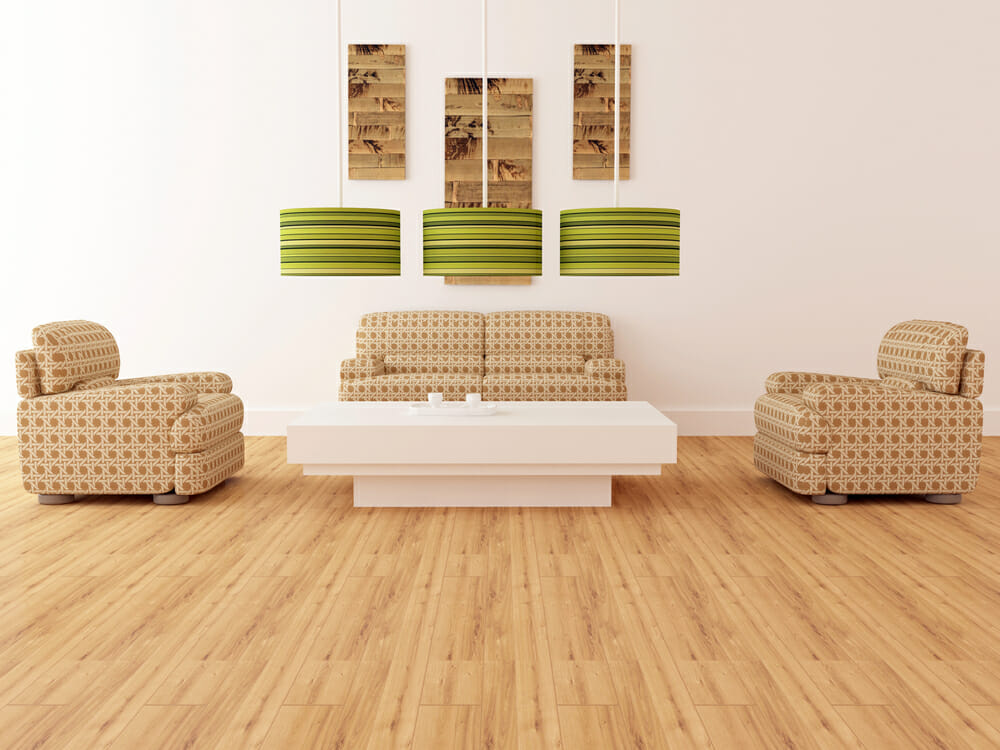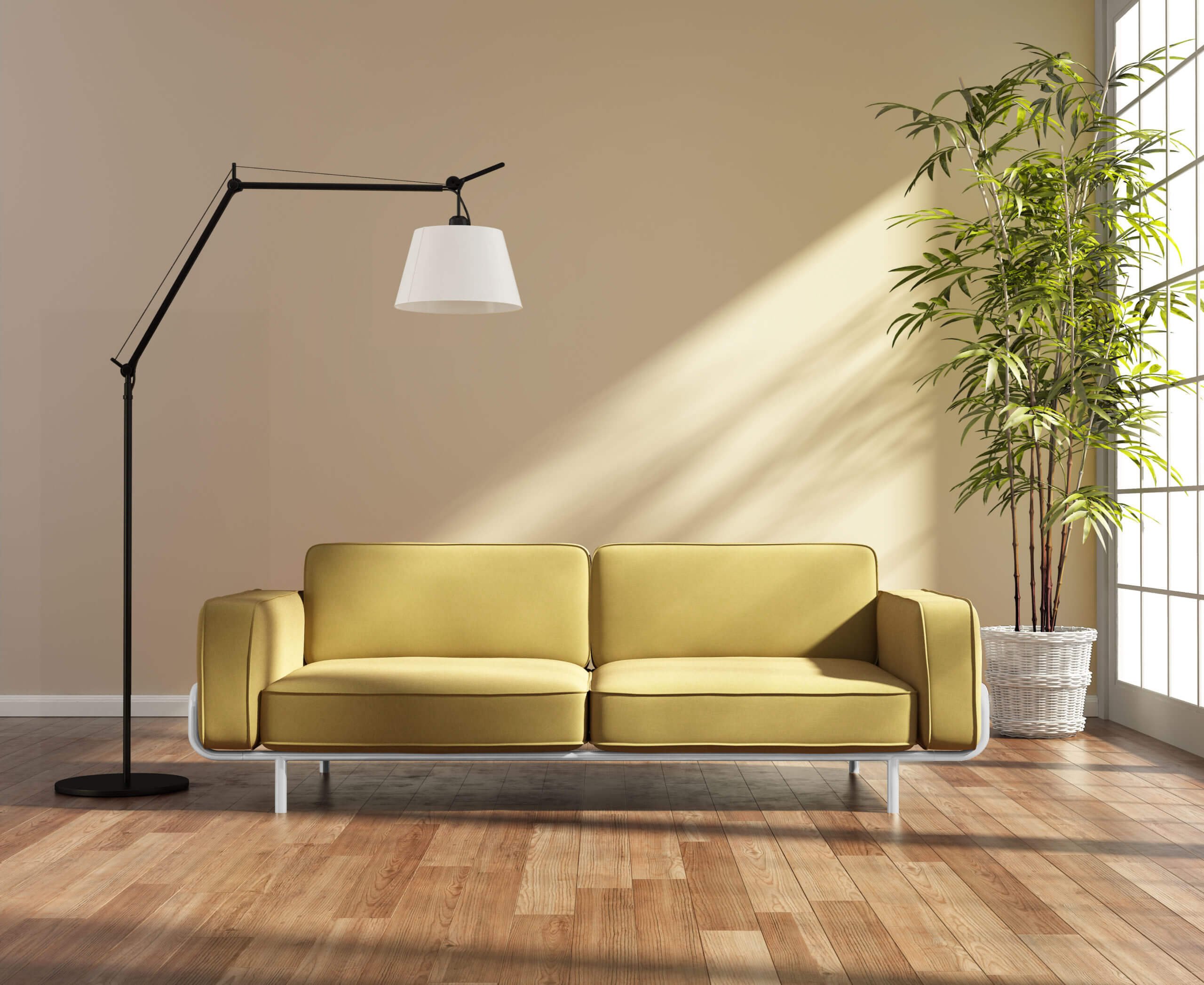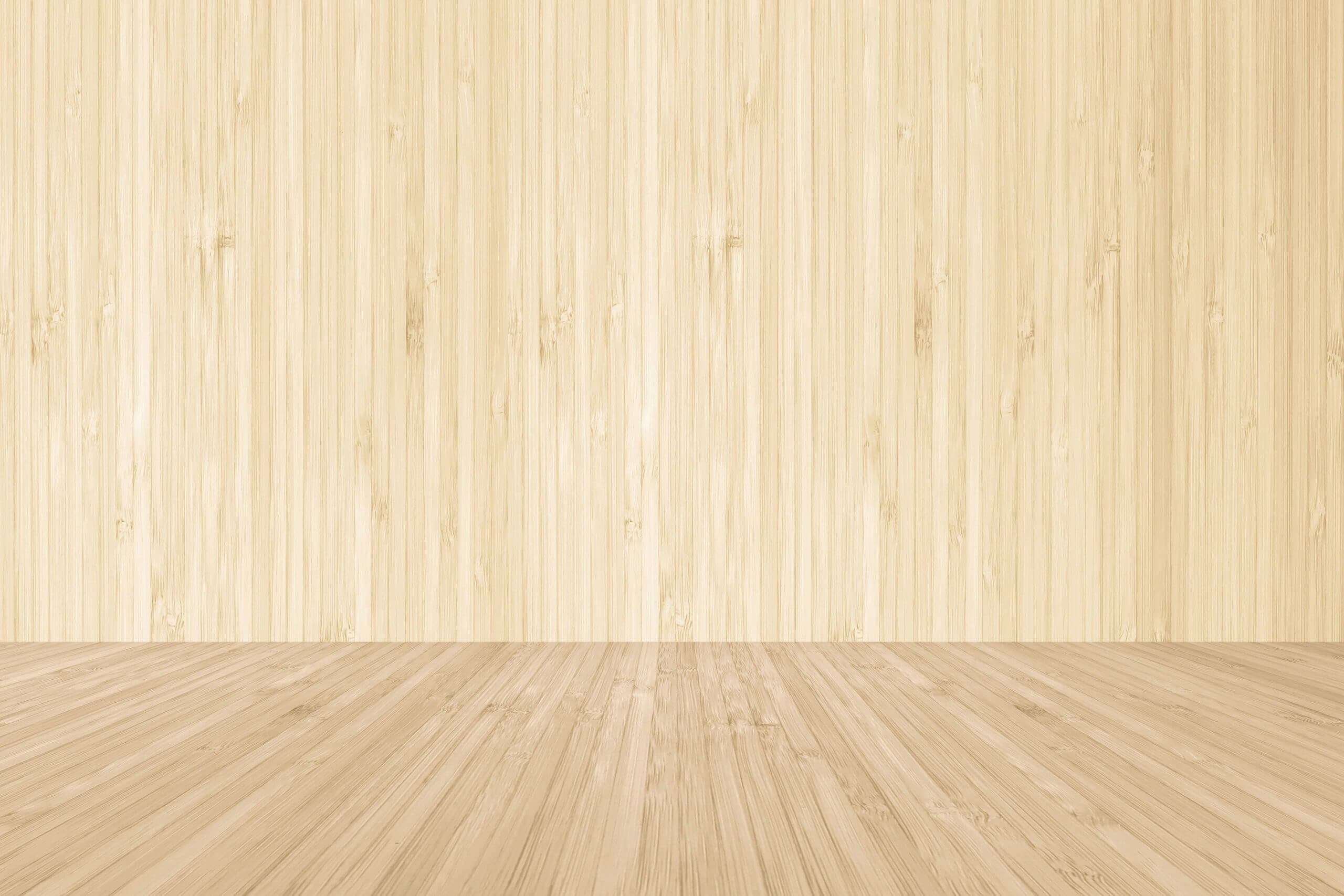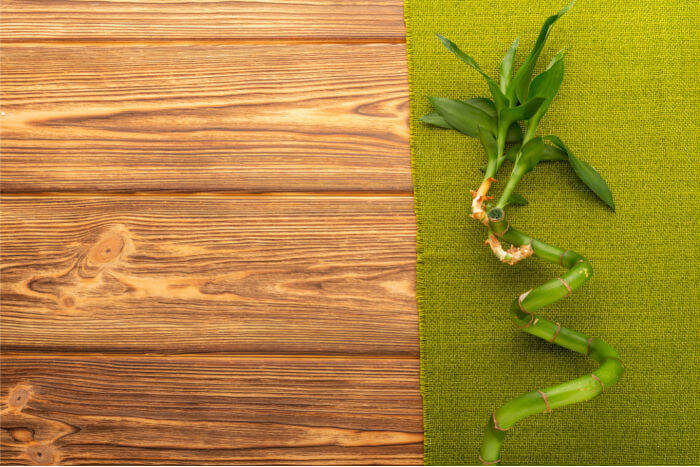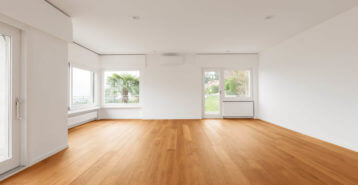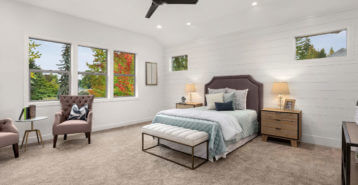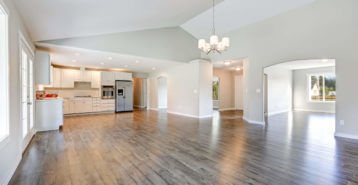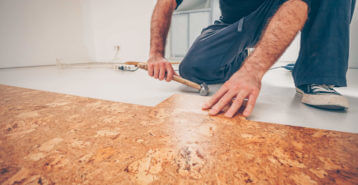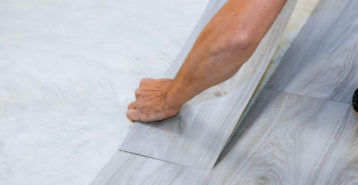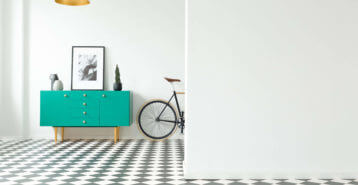If you like hardwood floors but want to try something a little different, bamboo flooring is an excellent option. Although bamboo is often considered hardwood flooring, bamboo is actually a type of grass that is shredded into small pieces and pressed together to make floor boards. The cost to install bamboo flooring is about the same as the cost to install hardwood floors.
As a renewable resource, bamboo is a sustainable option for homeowners who want a great looking floor that is also eco-friendly. In fact, in a 2021 Modernize survey, 13% of homeowners planning flooring projects reported they will install bamboo floors within the next year, making it one of the most popular modern flooring choices.
Although bamboo is not actually wood, it can be produced to resemble wood. With bamboo, you can get floors that appear like woods such as maple, walnut, or tigerwood. In addition, bamboo floors can be installed by a contractor in any of the areas where you would normally use wood, such as bathrooms, basements, bedrooms, and kitchens.
How Much Does Bamboo Flooring Installation Cost?
Installing bamboo flooring will cost between $5 to $15 per square foot on average. The exact installation cost will depend on the type of bamboo. For example, strand woven bamboo usually costs more than solid options, such as vertical and horizontal bamboo. Engineered bamboo is usually cheaper per square foot, compared to authentic bamboo and hardwood.
Also, bamboo is often more affordable than many high-end hardwood flooring options, such as maple and red oak, which can cost $15 per square foot or more.
Bamboo costs can vary across locations and contractors, so make sure to ask your contractor for more specific pricing for different bamboo floor options.
Bamboo Flooring Costs by Type
There are a few different types of bamboo to choose from ahead of your flooring project. A professional flooring contractor will be able to advise you on the different types of bamboo flooring and which one is best for your home. The following are different types you can choose from, and their average costs.
Horizontal Bamboo
Horizontal bamboo flooring is made up of strips of bamboo that are horizontally glued together, then pressurized and finished. This process creates a classic look that mimics hardwood, and makes the textured growth rings of the bamboo visible. Horizontal bamboo planks are on the more affordable end of the pricing spectrum, with an average cost of $5 per square foot installed.
Vertical Bamboo
This type of bamboo flooring has a linear and uniform look. Although the processing of bamboo is similar to the horizontal flooring, vertical bamboo has growth rings that are much thinner and less visible. However, vertical bamboo flooring creates a more modern and minimalistic appearance. This type of flooring is available in various color options, such as pale beige, golden brown and smoky dark brown. The cost for vertical bamboo is comparable to horizontal bamboo at $5 per square foot on average.
Strand Woven Bamboo
Strand woven bamboo is harder than the other types of bamboo floors. In fact, it is twice as hard and strong as oak hardwood flooring. It is made when bamboo is soaked in adhesive, then compressed in high heat and finished.
Strand-woven bamboo is considered a very high quality type of flooring and therefore costs more than horizontal and vertical types. You can expect an average cost of $6 to $10 per square foot for strand-woven bamboo, depending on the quality.
How Does Bamboo Rank Among Flooring Trends?
Modernize surveyed thousands of homeowners in September of 2023 who were actively pursuing flooring projects. 12% of respondents who indicated they would be installing new flooring in the next 12 months said they would choose bamboo.
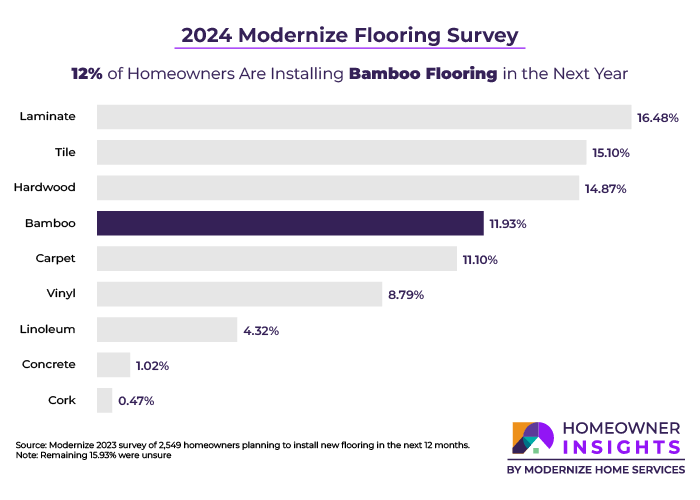
5.5% of homeowners surveyed said they already had bamboo flooring in their home.
Benefits of Bamboo Floors
In a July 2021 survey by Modernize, 33% of homeowners said they plan to start a flooring renovation project in the next 12 months. While only 5% of homeowners said they currently have bamboo floors in their home, 12% said they plan to renovate their home with a bamboo flooring installation.
Why are so many homeowners turning to this flooring material? It is not only unique and beautiful. It also has the same durability of hardwood, adds a modern aesthetic to the home, is eco-friendly and very easy to clean. With that being said, homeowners enjoy several benefits when they choose bamboo floors:
- Water resistance. One of the best characteristics of bamboo is its water resistance. It is more resistant to water and stains than regular hardwood.
- Eco-friendly. This flooring is made with sustainable grass that continues to grow even after harvesting. Look for the FSC label on the flooring to ensure it was produced sustainably.
- Durability. Bamboo is strand woven for extra strength and is twice as hard as oak hardwood. It can last 20-25 years when maintained properly.
- Hypoallergenic. This flooring is hygienic and hypoallergenic. It naturally resists dirt and dust particles as well as mildew.
- Design versatility. These floors can come in a variety of colors and unique finishes, from pale beige to golden tones.
- Low maintenance. Once you install these beautiful new floors, maintenance and cleaning is relatively easy.
Solid Bamboo Flooring vs. Engineered Bamboo
When searching for bamboo flooring, you may find that there are two options available – solid vs. engineered. The key difference between the two is in how they are made.
Solid bamboo flooring is made purely from natural bamboo. Strips of bamboo fibers are glued together to form planks that are 3/8″ to 3/4″ thick, which are nailed down to the floor. Solid bamboo planks do not have subflooring layers built in. This makes them more affordable than engineered bamboo but also slightly less strong.
Engineered bamboo flooring, on the other hand, is made with both natural bamboo and subflooring layers. The top layer is usually strand woven bamboo and the bottom layers are high density fiberboard or multi-layer plywood. Because of these additional layers, engineered bamboo flooring is both more expensive and sturdier than solid bamboo.
When deciding between solid vs. engineered flooring, consider the foot traffic in a particular room, humidity levels in your area, and of course your budget. In areas of heavy foot traffic or high humidity (think: bathrooms), it is best to go with engineered flooring. If you are looking for natural bamboo on a budget, go with solid bamboo flooring.
Popular Alternatives to Bamboo Flooring
If you are considering bamboo for your new flooring installation, these other types of floors may be of interest to you.
Vinyl
Vinyl flooring is of interest to many homeowners today because it can mimic natural wood flooring at a much lower cost. High-quality vinyl planks are easy to install, very low maintenance, and water-resistant.
However, compared to bamboo, vinyl is much less eco-friendly as it is a man-made synthetic material. Likewise, it has a less natural look and feel compared to bamboo, and is less comfortable underfoot. Bamboo is also more durable than vinyl and tends to more effectively stand the test of time and heavy use.
Laminate
Laminate flooring is another cheap, synthetic lookalike alternative to natural wood floors. Nowadays, laminate comes in such a wide variety of designs that it is easy to find flooring that closely resembles your hardwood of choice – even bamboo. Believe it or not, laminate and bamboo are quite equal when it comes to maintenance and comfort underfoot.
Compared to bamboo, laminate is also less durable and eco-friendly. It is also much less water-resistant. However, you will likely save a chunk of change on installation when choosing laminate.
Wood
As mentioned, bamboo is often mistaken for natural hardwood floors. It has a similar hardness and durability to many types of wood flooring, and has a similar price point. But there are some key differences.
Real hardwood floors tend to vary more in texture and grain patterns compared to bamboo. Many types of wood floors are also much more expensive to install than bamboo floors. While bamboo tends to have a longer lifespan than laminate floors, most types of hardwood will outlast bamboo. However, it is worth looking into the different types of hardwood and compare them to bamboo. There are certainly some types of wood flooring that will come in at a lower price point.
How to Maintain Your New Flooring
Bamboo floors are extremely low maintenance. All that is needed to keep them looking great is to regularly sweep dust and debris off of them. Then, as needed, you can mop the floors to keep them at their best. Bamboo floors are maintained the best when they are not waxed.
Many types of bamboo flooring can be refinished to improve the appearance of surface level damage, such as dents. After several years of use, it is a good idea to speak to a flooring contractor about whether or not it’s time for you to refinish your bamboo floors.
Hiring a Professional Contractor
Bamboo can add a special flair to your home. It is possible to rip out your old flooring and install new bamboo floors on your own. However, this can be a complicated and costly DIY project, and many homeowners save money by using a contractor.
As with many home renovations, finding the right contracting partner will also be a big help in choosing the right type of flooring. Let Modernize help you find the right flooring contractor who can help you take the first step of your journey.
Compare top-rated flooring pros in your area.
Read real homeowner reviews, explore qualifications, and view promotions. Modernize makes it easy to browse professionals and find one that will be perfect for your project.
